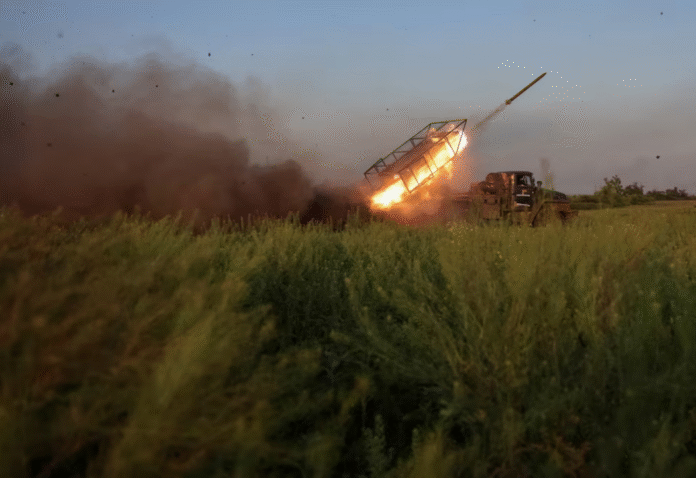Kyiv/London – European leaders on Saturday welcomed US President Donald Trump’s plans to meet with Russian President Vladimir Putin on ending the war in Ukraine. They stressed the need to maintain pressure on Moscow and protect Ukrainian and European security interests.
Trump plans to meet Putin in Alaska on Friday. He said the parties, including Ukrainian President Volodymyr Zelensky, are close to reaching an agreement that could resolve the three-and-a-half-year conflict.
A White House official said that the US President is open to holding a tripartite summit with Putin and Zelensky. However, the White House is currently planning to hold a bilateral meeting at Putin’s request.
Details of the potential deal have not been made public. However, Trump has said it would include a “land swap that serves the interests of both parties.” The deal could require Ukraine to cede large parts of its territory, which Zelensky and his European allies say would encourage Russia to attack.
US Vice President J.D. Vance met with British Foreign Secretary David Lammy and representatives of Ukraine and European allies on Saturday at Chevening House. They discussed Trump’s peace efforts at the country mansion southeast of London.
A joint statement by the leaders of France, Italy, Germany, Poland, Britain, Finland, and the President of the European Commission welcomed Trump’s efforts. They stressed the need to maintain support for Ukraine and pressure Russia.
“We agree that a diplomatic solution must protect the vital security interests of Ukraine and Europe,” they said.
“We agree that these vital interests include the need for strong and reliable security guarantees that enable Ukraine to effectively defend its sovereignty and territorial integrity,” the statement said. The statement added, “The path to peace in Ukraine cannot be determined without them.”
“They remain committed to the principle of not changing international borders by force,” the leaders said. They added, “The current line of communication must be a starting point for negotiations.” Additionally, negotiations can only take place within the context of a ceasefire or a reduction in hostilities.
“The front line, not the border”
Andrei Yermak, Zelensky’s chief of staff, participated in talks with European leaders and US officials. He said Ukraine was grateful for their constructive approach.
Yermak’s speech came in a television interview. He added, “A ceasefire is necessary – but the front line is not a border”, stressing Kiev’s position that it will reject any territorial concessions to Russia.
Yermak also thanked Vance for his “respect for all points of view” and his efforts to achieve a “reliable peace”.
A European official said that European representatives submitted a counter-proposal, refusing to provide details.
The proposal
The Wall Street Journal said the counter-proposal included demands that a ceasefire take place before any further steps are taken. They also demanded that any land exchange be reciprocal with firm security guarantees.
The newspaper quoted a European negotiator as saying: “A process of ceding territory cannot begin amid the fighting”.
A US official said the hours-long meetings in Chevening “resulted in significant progress toward President Trump’s goal of ending the war in Ukraine.” This was ahead of President Trump and President Putin’s upcoming meeting in Alaska.
The White House did not immediately respond when asked about European counterproposals.
A Downing Street spokesman said British Prime Minister Keir Starmer and French President Emmanuel Macron spoke. They pledged to find a “just and lasting peace” in Ukraine and give “steadfast support” for Zelensky. They welcomed Trump’s efforts to end the fighting.
A series of calls
It is not yet clear whether anything was agreed upon at the Chevening meeting. However, Zelensky described the meeting as constructive.
“The path to peace in Ukraine must be determined together, and only with Ukraine, and this is the fundamental principle,” he said. He addressed this in his evening speech to Ukrainians.
Macron stressed the need for Ukraine to play a role in any negotiations.
“Ukraine’s future cannot be determined without Ukrainians, who have been fighting for their freedom and security for more than three years,” he wrote on X. He described phone calls with Zelensky, German Chancellor Friedrich Merz, and Starmer. “Europeans will also be part of the solution, because their security is at stake,” he added.
Zelensky has made a series of phone calls with Ukraine’s allies since Trump envoy Steve Witkov’s visit to Moscow on Wednesday. Trump said he had made “significant progress”.
Ukraine and the European Union rejected proposals they saw as major concessions in favor of Putin, whose forces invaded Ukraine in February 2022. Russia justifies the war on the basis of what it calls threats to its security from Ukraine’s shift towards the West.
Kiev and its Western allies say the invasion is an imperial-style land grab.
Moscow claimed four Ukrainian regions – Luhansk, Donetsk, Zaporizhia, and Kherson – in addition to the Crimean Peninsula overlooking the Black Sea, which it annexed in 2014.
Skepticism about the implementation of the agreement
Russian forces do not fully control all territory in the four regions. Russia has demanded that Ukraine withdraw its forces from the parts it still controls.
Ukraine says its forces still maintain a limited foothold in Russia’s Kursk region. This is a year after crossing the border in an effort to gain influence in any negotiations. Russia announced that it had expelled Ukrainian forces from Kursk in April.
Tatiana Stanovaya, a senior fellow at the Carnegie Russia and Eurasia Center, said the current push for peace is the first “fairly realistic” attempt to stop the war. However, she remained skeptical about implementing the agreements.
“There is no doubt that the new commitments could be devastating for Ukraine,” she added.
Fierce fighting continues along the more than 1,000-kilometer front line in eastern and southern Ukraine. Russian forces control about a fifth of the country’s territory.
Russian forces are slowly advancing into eastern Ukraine. However, their summer offensive has so far failed to achieve a major breakthrough, according to Ukrainian military analysts.







